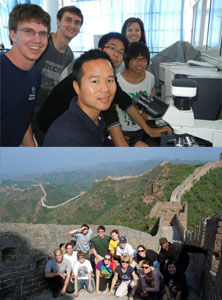Center Valley, PA (June 29, 2011) – The reality of urbanization and industrialization is leaving a mark on an important life-sustaining resource -- water -- especially in China. Students from Penn State University and China's Jiangnan University recently addressed the problem head-on, undertaking field research on the shores of Lake Taihu, China's third largest fresh water lake, from May 14-31. While there, they studied the effects of industrial, municipal and urban development within Jiangsu Province- -- one of the most industrialized regions in China -- and offered strategic suggestions for the lake's restoration.
The hands-on research adventure was part of Penn State Lehigh Valley’s 2011 field course, Biology 497C, "Global Environmental Sustainability: A Field Study in China"(http://www2.lv.psu.edu/jxm57/explore/china2011/) and its larger international program, CHANCE (Connecting Humans And Nature through Conservation Experiences).
To gain understanding of the issues, the interdisciplinary group of 28 students, many from the Lehigh Valley campus, and 10 faculty attended a day-long workshop, carried out field-based research at northern and southern sites along the shores and in the lake, visited water treatment plants and factories, and met with local residents and leaders.
"Working with the Chinese students and faculty to collect field data and run laboratory tests really made me feel like a global citizen," said Mike Neel of Schnecksville, a junior majoring in science. "We worked together to combat a problem that threatens the entire world."
The course practicum began with a day-long workshop, The Water Environment and the Ecological Restoration of Taihu Lake, which featured speakers such as renown scientist Richard Alley of Penn State’s Earth and Mineral Sciences Institute, and Zhejiang University’s Chen Yingxu.
Next, they conducted cooperative experiments on the water quality of, and land use around, Lake Taihu to improve their awareness of environmental problems and learn sampling and analysis methods used to diagnose aquatic ecosystem health and stability. After analyzing the chemical, biological, and physical characteristics, students found that nutrient levels are indicative of a eutrophic state and unsafe for human consumption. Since Lake Taihu remains an important ecological and therefore economic concern for nearby Wuxi City, the students’ results indicate that more waste and industrial water treatment facilities are warranted, as is enhanced environmental education to create a more knowledgeable and responsible citizenry.
"The good news is that restoration efforts presently in place (blue-green algae salvage ships, dredging lake bottom, factory relocation, artificial floating beds, introduction of algae eating fish, water transferring via Yangtze River tributaries, restoration of riparian buffers) are cumulatively acting to lessen the eutrophication process," said Jacqueline McLaughlin, associate professor of biology at Penn State Lehigh Valley, who led the field course.
At the conclusion of the practicum, students, faculty members, technical experts, government leaders, business leaders, and noted American and Chinese scientists met and fielded questions about the economic and environmental health of the area studied. Students delivered group research projects on the water quality and sustainability of Lake Taihu, including experimental design, implementation, and data interpretation.
For more information on this course and other CHANCE programs, contact Jacqueline McLaughlin, founding director of CHANCE, at [email protected] or visit www.chance.psu.edu.




